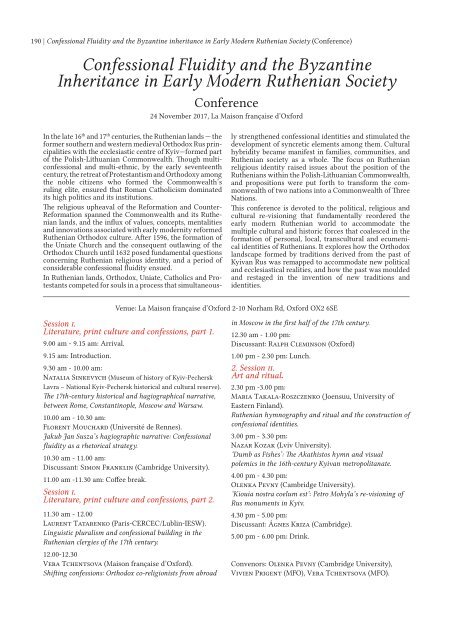Museikon_1_2017
You also want an ePaper? Increase the reach of your titles
YUMPU automatically turns print PDFs into web optimized ePapers that Google loves.
190 | Confessional Fluidity and the Byzantine inheritance in Early Modern Ruthenian Society (Conference)<br />
Confessional Fluidity and the Byzantine<br />
Inheritance in Early Modern Ruthenian Society<br />
Conference<br />
24 November <strong>2017</strong>, La Maison française d’Oxford<br />
In the late 16 th and 17 th centuries, the Ruthenian lands — the<br />
former southern and western medieval Orthodox Rus principalities<br />
with the ecclesiastic centre of Kyiv—formed part<br />
of the Polish-Lithuanian Commonwealth. Though multiconfessional<br />
and multi-ethnic, by the early seventeenth<br />
century, the retreat of Protestantism and Orthodoxy among<br />
the noble citizens who formed the Commonwealth’s<br />
ruling elite, ensured that Roman Catholicism dominated<br />
its high politics and its institutions.<br />
The religious upheaval of the Reformation and Counter-<br />
Reformation spanned the Commonwealth and its Ruthenian<br />
lands, and the influx of values, concepts, mentalities<br />
and innovations associated with early modernity reformed<br />
Ruthenian Orthodox culture. After 1596, the formation of<br />
the Uniate Church and the consequent outlawing of the<br />
Orthodox Church until 1632 posed fundamental questions<br />
concerning Ruthenian religious identity, and a period of<br />
considerable confessional fluidity ensued.<br />
In Ruthenian lands, Orthodox, Uniate, Catholics and Protestants<br />
competed for souls in a process that simultaneously<br />
strengthened confessional identities and stimulated the<br />
development of syncretic elements among them. Cultural<br />
hybridity became manifest in families, communities, and<br />
Ruthenian society as a whole. The focus on Ruthenian<br />
religious identity raised issues about the position of the<br />
Ruthenians within the Polish-Lithuanian Commonwealth,<br />
and propositions were put forth to transform the commonwealth<br />
of two nations into a Commonwealth of Three<br />
Nations.<br />
This conference is devoted to the political, religious and<br />
cultural re-visioning that fundamentally reordered the<br />
early modern Ruthenian world to accommodate the<br />
multiple cultural and historic forces that coalesced in the<br />
formation of personal, local, transcultural and ecumenical<br />
identities of Ruthenians. It explores how the Orthodox<br />
landscape formed by traditions derived from the past of<br />
Kyivan Rus was remapped to accommodate new political<br />
and ecclesiastical realities, and how the past was moulded<br />
and restaged in the invention of new traditions and<br />
identities.<br />
Session i.<br />
Literature, print culture and confessions, part 1.<br />
9.00 am - 9.15 am: Arrival.<br />
9.15 am: Introduction.<br />
Venue: La Maison française d’Oxford 2-10 Norham Rd, Oxford OX2 6SE<br />
9.30 am - 10.00 am:<br />
Natalia Sinkevych (Museum of history of Kyiv-Pechersk<br />
Lavra – National Kyiv-Pechersk historical and cultural reserve).<br />
The 17th-century historical and hagiographical narrative,<br />
between Rome, Constantinople, Moscow and Warsaw.<br />
10.00 am - 10.30 am:<br />
Florent Mouchard (Université de Rennes).<br />
Jakub Jan Susza’s hagiographic narrative: Confessional<br />
fluidity as a rhetorical strategy.<br />
10.30 am - 11.00 am:<br />
Discussant: Simon Franklin (Cambridge University).<br />
11.00 am -11.30 am: Coffee break.<br />
Session i.<br />
Literature, print culture and confessions, part 2.<br />
11.30 am - 12.00<br />
Laurent Tatarenko (Paris-CERCEC/Lublin-IESW).<br />
Linguistic pluralism and confessional building in the<br />
Ruthenian clergies of the 17th century.<br />
12.00-12.30<br />
Vera Tchentsova (Maison française d’Oxford).<br />
Shifting confessions: Orthodox co-religionists from abroad<br />
in Moscow in the first half of the 17th century.<br />
12.30 am - 1.00 pm:<br />
Discussant: Ralph Cleminson (Oxford)<br />
1.00 pm - 2.30 pm: Lunch.<br />
2. Session ii.<br />
Art and ritual.<br />
2.30 pm -3.00 pm:<br />
Maria Takala-Roszczenko (Joensuu, University of<br />
Eastern Finland).<br />
Ruthenian hymnography and ritual and the construction of<br />
confessional identities.<br />
3.00 pm - 3.30 pm:<br />
Nazar Kozak (Lviv University).<br />
‘Dumb as Fishes’: The Akathistos hymn and visual<br />
polemics in the 16th-century Kyivan metropolitanate.<br />
4.00 pm - 4.30 pm:<br />
Olenka Pevny (Cambridge University).<br />
‘Kiouia nostra coelum est’: Petro Mohyla’s re-visioning of<br />
Rus monuments in Kyiv.<br />
4.30 pm - 5.00 pm:<br />
Discussant: Ágnes Kriza (Cambridge).<br />
5.00 pm - 6.00 pm: Drink.<br />
Convenors: Olenka Pevny (Cambridge University),<br />
Vivien Prigent (MFO), Vera Tchentsova (MFO).


